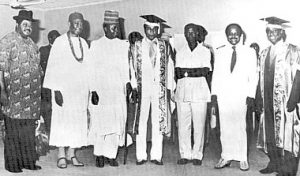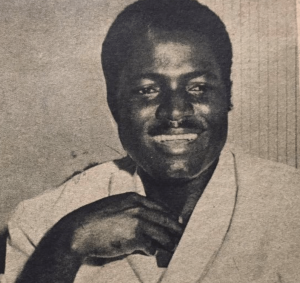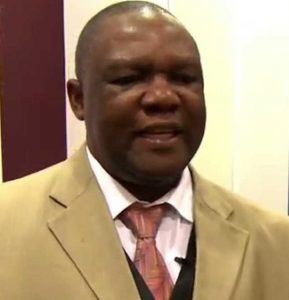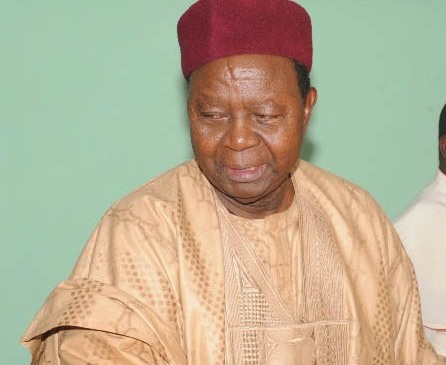By Adagbo ONOJA
Current fascination with the late Chief Solomon Lar’s politics in relation to alternative counter-hegemonic practices has a rather accidental origin. This student arrived at the University of Warwick in late 2013 to commence a graduate program in International Security but only to find the first three weeks dedicated to clarifying the concept of security. What is security other than what the police, the military and spooks do and to warrant so much time dedicated to clarifying it, the JJC asked himself? Well, in the end, security as a concept turned up to have several different meanings, well beyond anything that security agents do. A ‘Broadening and Deepening’ of security had been building up even before the USSR broke up and had produced multiple notions of the term.
Three of them are very popular today. One of the three is what we know and do most in Nigerian academia – the Realist or conventional strategic studies stuff – if I am more muscular than you, too bad for you, meaning troops, spies and all that. The second most popular school is Securitisation School which says there is no such thing as security or security threat in an objective sense. Security is always for someone and for some purpose. It is always about who defines the threat and who gets protected. It is fairly common in Nigerian security studies but rarely ever linked to the post-modernist epistemology from where it emanated. The third one is the notion of security as Emancipation. It is coming from the Marxist tradition but not in its orthodox sense. For this school, security is freedom from physical, structural or psycho-social impositions or as Ken Booth who articulated it in his 1991 Conference paper of that title would say, freedom from any conditions that makes it impossible for anyone to be what it is to be human. This is what goes by the name The Welsh School in critical security studies, named so because Prof Booth – the source of the initial theoretical outline – is based at the University of Aberystwyth in The Wales, (UK).

Chief Lar in the midst of other giants in the past: Dr Michael Okpara, premier of the East in the 1st Republic; Dr Nnamdi Azikiwe,, Jim Nwobodo who was gov of then Anambra State; Chief Melford Okilo, gov of Rivers then; Mr. Aper Aku, gov of then Benue State and Prof. Kenneth Dike, pioneer African VC of UI
This background brought Solomon Lar into one’s mental radius as never before because there is a direct connection between the Emancipation that was the organising concept of his politics and this conception of security. The genius of Lar’s theory and practice of Emancipation is that he (Lar) operationalised his 12 good years before Booth proclaimed Emancipation as a theoretical contention in understanding security. If you say that it was some brains who crafted the concept for him, it is still a statement on Lar’s brilliance because it takes a brilliant mind to know a brilliant mind.
The profundity of Lar in that move is that he grounded his politics in an overarching concept, a very rare attribute of the typical Nigerian politician. Above all, Emancipation is what all the progressive governors were doing in one form or the other across Nigeria in the Second Republic – from Gov Goni in Borno to Rimi in Kano to Balarabe Musa in Kaduna right to Lateef Jakande in Lagos. They were freeing people from conditions unworthy of human beings in one form or the other.
The peculiarity of Lar’s Emancipation is the way it responds to the historical tension between the Middle Belt and the much talked about Caliphate imaginary. In Southern Kaduna, parts of Plateau State, parts of Bauchi and Nasarawa State and so on, the hierarchy of power is such that many communities could only speak to the authority through some representatives who could neither understand their sentiments, feelings, hopes and aspirations nor were trained to even try. This is because they have been posted from Zaria or some privileged centre of power within the colonial process. The Mai Unguwa, District Head and other local power potentates were of that source. It means that the power of voice which is the most crucial condition of possibility for freedom was denied them. In that context, creating as many chiefdoms as Lar was doing under his Emancipation was more than modernizing the traditional institution but providing security in a very comprehensive manner – socio-economic, cultural, psychological and political.
When I discussed with Alhaji Aliyu Akwe Doma, the late governor of Nasarawa State who was Lar’s deputy in the Second Republic, restoring voice to such communities was the core of Lar’s Emancipation. In fact, Alhaji Akwe Doma was Lar’s field commander in implementing the Emancipation program, totally rubbishing the organised attack on it that it was anti-Muslim. That propaganda was the handiwork of some Kaduna based elite, those that the late Dr. Junaid Muhammed described as people who could not count up to five persons living on the same street.
With the late Solomon Lar, Emancipation was a response to the kind of power relations that Dr. Obadiah Mailafia, for example, was shooting at. There is no tight separation between discourse as Dr. Mailafia was involved in and discursive practice as Lar was involved in beyond the superiority claimed for practice in most arguments. It is tempting to say that Lar was able to give practical expression to Emancipation because he was in power. That can only be a partial ‘truth’ because Lar went on to become the first National Chairman of the People’s Democratic Party, (PDP) before its discretion by the autocratic fraction of the party. Considering that the PDP was a coalition of the most important fractions of the Nigerian establishment in 1998, that endorsement by all those fractions speaks to the iconic in his theory and practice of Emancipation. What it challenges all of us to do is not to say he could do it because he was in power. Rather, the challenge is to keep on identifying practical spaces of denial of emancipation and insist on the correction of same, irrespective of whether we are in one government or the other.

The late Senator Joseph Tarka, another grandmaster
The key point is that Chief Lar updated Senator Joseph Tarka’s strategy and both of them reminds us of the drawbacks inherent in the ‘we/they’ binary that defines discourse approach. For instance, how would any Middle Belt insurgent intellectual fail to recognise that Sultan Ibrahim Dasuki played a radical role in reducing the unequal power relationship between the Caliphate and the Middle Belt by dethroning the aristocracy from power over the Native Authority, its courts, police and land? Irrespective of what drove him to do that – whether it was General Shehu Yar’Adua using him to undo the aristocracy ahead of his departure from the military to politics or Dasuki’s payback time for the Sultanate players for blocking his uncle from the throne much, much earlier – the 1976/78 Local Government Reform over which Dasuki presided had radical trickle-down effects.
Secondly, in the narratives of most Middle Belt insurgent intellectualism so far, particularly much of the newspaper level anti-feudal rhetoric, theses and such other documentation, there is a tendency to represent the Middle Belt areas as the victims and, by implication, the emirate power architecture as the cultural and military superiors. That is the bad history writing in the victimhood that Middle Belt activists claim against the Caliphate. When such a claim is made, it denies the heroism of the leaders of the Middle Belt in the struggle. There is no human situation in which a fight produces victims only on one side. Even the winners in every war have suffered losses. So, any side that positions itself as the victim in a human conflict as the one we are talking about is denying the heroism of its own leaders. The critical way of writing that history would have been to take on board the different sites of the clashes. That makes it possible to take good record of heroes, winners and losers in each of such encounter in the hostility.

Dr. Mailafia
But the answer is also not in swinging from one extreme to another as in saying things such as “they didn’t conquer us”. Saying so embody a suggestion that they conquered some others and must, therefore, be good at conquering and thus the opposite of you the speaker. Or when there is reference to Fulanis as ‘people who think they are born to rule”, the writer or speaker of that sentence is complicit in constituting them into precisely that reality because words can, in most contexts, perform the reality they speak of
But the point in all these is to note that it is very strategic for analysts to watch their language because of what is generally known as the polysemous perversity of language. A proper Deconstruction of any language use can show a stunningly different meaning from what we thought we meant. This does not imply an attack on discourse but drawing attention to the complications of language use.
What again does the death of Dr Obadiah compel us to reflect upon in relation to the paradox of the best and brightest of the Middle Belters ending up railing at the system? Why is it not the case that the Middle Belt has articulated any clear demand on Nigeria which everyone knows of and the support or antagonism of which should define its ‘friends’ and ‘enemies’ and ‘frenemies’? The Igbos, for instance, have achieved it by producing a hegemonic articulation of the case for Igbo presidency. There is bound to be competing interpretations of that articulation as well as criticisms of the associated tactics but everyone is conscious of it. It is doubtful if that is the case with the Middle Belt. Instead of such approach, the Middle Belt players arrived the domain of politics with fixed or unchanging meaning of History and, by implication, pre-given friends and enemies. But that goes against the pervasive notion of politics as negotiated accommodation along the terrains of permanently changing interests.
It is difficult writing about Dr. Mailafia in the past. He should have been here so that the debate could continue. The tragedy is that he is far away now at a time when it is difficult to find leaders in terms of capacity for high level of abstraction of the crisis we are in across Nigeria in general and in the Middle Belt in particular. Too many people are too excited jumping up and down as to be unable to anticipate the implications of certain things in the world taking shape today and how it would be like in another 20, 30 or 40 years. For instance, every world war has produced a revolution in its aftermath. There is a world war going on right now in the sense that there is nowhere that the global ‘War on Terror’ has left unaffected, somehow. In Nigeria, for instance, Boko Haram has conservatively claimed 40, 000 lives. What sort of revolution might follow the global ‘War on Terror’ and where might the revolution likely take place? Europe or North America or Asia or somewhere in Africa?
Against this background and as a specific site of human activity, the Middle Belt needs to be tended and defended in terms of anticipating the future because, otherwise, human beings would suffer. But what notion of security is any think tank or research institute or group of politicians or NGOs working on in relation to the Middle Belt area? Are there universities producing specialisation on the region? That is, universities that are universities, not these wretched things we have where there could be up to 3000 students in a class. A university which could have a class with 3000 students cannot claim to be offering anybody any form of knowledge. And many of the public universities in Nigeria are like that in most of the courses except Medicine, probably. May Dr. Obadiah Mailafia’s spirit dwell among us!
Perhaps, the dynamics have worked out in such a manner that the Catholic Bishop of Sokoto, Bishop Mathew Hassan Kukah would have to review his paradigm of politics with a view to adding and accomplishing the task of framing the Middle Belt conundrum to his other commitments. Others might have their own nominees for this task but the Bishop is the one who has ever since put his fingers on the framing question as the requirement for any way forward, (download his interview with Africa Confidential a few years ago). He is thus good fit to move the folks from ecstatic to critical appreciation of social media hogwash.




























